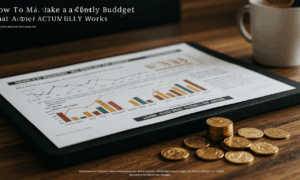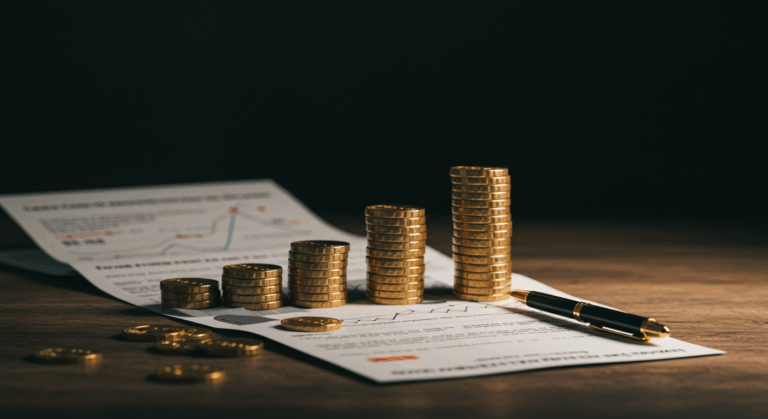Economic Recession Ahead: 7 Direct Effects on Your Wallet and How to Prepare
The term economic recession is appearing more frequently in financial news, and for good reason. While economists debate the timing and severity, the possibility of a significant economic downturn is a reality we must all consider. An impending recession isn’t just an abstract concept for Wall Street; it has tangible, direct consequences for your personal finances, from your job security to the value of your savings. Understanding these effects is the first step toward building a resilient financial plan.
This article will not dwell on fear. Instead, it will serve as your practical guide, breaking down the seven most significant ways an economic downturn can impact your wallet. More importantly, we will provide clear, actionable steps you can take right now to prepare, protect your assets, and navigate the challenges ahead with confidence. By being proactive, you can fortify your financial position against the coming storm.
1. The Job Market Tightens and Job Security Falters
One of the most immediate and personal effects of a recession is its impact on the labor market. As companies face declining profits and consumer demand shrinks, they often respond by implementing hiring freezes, slowing down promotions, and, in many cases, resorting to layoffs to cut costs. This creates a much more competitive environment for job seekers and can introduce a level of uncertainty for those who are currently employed.
How to Prepare:
- Fortify Your Position: Make yourself indispensable at your current job. Take on new responsibilities, lead projects, and continuously demonstrate your value.
- Update Your Toolkit: Refresh your resume and LinkedIn profile. Identify skills that are in high demand within your industry and consider online courses or certifications to acquire them.
- Network Proactively: Do not wait until you need a new job to start networking. Maintain and build your professional connections now. A strong network is a powerful asset during an economic contraction.
- Build an Emergency Fund: This is non-negotiable. Aim to have at least three to six months of essential living expenses saved in a high-yield savings account. This fund is your primary buffer against unexpected job loss.
2. Your Investment Portfolio Faces Volatility
During periods of economic uncertainty, financial markets often experience heightened volatility. Stock prices can fall sharply as investor fear overtakes optimism, and corporate earnings decline. If you have a 401(k), an IRA, or any other brokerage account, you will likely see the value of your portfolio decrease, sometimes significantly, in the short term. It can be unsettling to watch years of gains evaporate in a matter of months.
How to Prepare:
- Do Not Panic Sell: The cardinal rule of long-term investing is to avoid making emotional decisions. Selling your assets during a market downturn locks in your losses and prevents you from benefiting from the eventual recovery. Remember that recessions are a normal part of the economic cycle.
- Review Your Asset Allocation: Ensure your portfolio is diversified across different asset classes (stocks, bonds, etc.) in a way that aligns with your risk tolerance and time horizon. A well-diversified portfolio is better equipped to weather market storms. For more ideas on managing your portfolio, check out our investment section.
- Consider Dollar-Cost Averaging: A recession can be a buying opportunity for long-term investors. Continuing to invest a fixed amount of money at regular intervals allows you to buy more shares when prices are low, potentially lowering your average cost per share over time.

3. Credit Becomes Tighter and More Expensive
When the economy slows down, banks and other lenders become more cautious. They are more concerned about the risk of borrowers defaulting on their loans. As a result, they tighten their lending standards, making it more difficult to get approved for mortgages, auto loans, personal loans, and even new credit cards. For those who do get approved, the terms are often less favorable, with higher interest rates and stricter requirements.
How to Prepare:
- Check and Improve Your Credit Score: Your credit score is your most important financial report card. Obtain a copy of your credit report, dispute any errors, and work on improving your score by paying bills on time and keeping credit card balances low. A higher score makes you a more attractive borrower.
- Aggressively Pay Down High-Interest Debt: Focus on eliminating or reducing variable-rate debt, especially on credit cards. As central banks may raise rates to fight inflation, the interest on this debt can skyrocket, draining your cash flow when you need it most.
- Secure Financing Now: If you anticipate needing a major loan, like a mortgage refinance or a home equity line of credit, it may be prudent to secure it before the recession fully hits and lending standards become even more restrictive.
4. The Real Cost of Living Strains Your Budget
A recession can create a confusing economic picture. While the prices of some discretionary goods like electronics or cars might fall due to lack of demand, the cost of essentials such as food, utilities, and healthcare can remain high or even continue to rise, a phenomenon sometimes linked to stagflation. This means your income, even if it remains stable, buys less than it used to. This erosion of purchasing power is a silent drain on your wallet.
How to Prepare:
- Create a Recession-Proof Budget: Track every dollar you spend for a month to understand exactly where your money is going. Categorize expenses into needs and wants.
- Cut Non-Essential Spending: Be ruthless in identifying and cutting back on wants. This could mean fewer subscriptions, dining out less, or delaying non-urgent purchases. The goal is to free up cash flow for savings and debt repayment. Explore our Savings page for more practical tips.
- Shop Smarter: Look for deals, use coupons, buy generic brands, and plan your meals to reduce food waste. Small changes in your daily spending habits can add up to significant savings over time.
5. Real Estate Values May Decline
The housing market is highly sensitive to the overall health of the economy. During a recession, higher unemployment and tighter credit can lead to a decrease in demand for homes. This can cause property values to stagnate or fall. For homeowners, this means a reduction in their home equity and overall net worth. For those looking to sell, it can mean a longer time on the market and a lower selling price.
How to Prepare:
- For Homeowners: Focus on your long-term plan. Continue making your mortgage payments and view your home primarily as a place to live, not just a short-term investment. If you are not forced to sell, you can ride out the downturn.
- For Potential Buyers: A recession can present a buying opportunity with lower prices and less competition. However, this is only true if you have a secure job, a substantial down payment, and a robust emergency fund. Do not try to time the market perfectly; buy when it is right for your personal financial situation.
6. Business and Entrepreneurial Opportunities Diminish
For small business owners and entrepreneurs, a recession is a direct threat to their livelihood. Consumers cut back on discretionary spending, which directly impacts revenue. Access to capital and business loans dries up, making it difficult to fund operations or expansion. The overall climate of uncertainty makes it a challenging time to launch a new venture.
How to Prepare:
- If You Own a Business: Focus on fundamentals. Manage your cash flow meticulously, reduce overhead, and double down on customer service to retain your most loyal clients. Adapt your offerings to meet the changing needs of your customers.
- If You Are an Aspiring Entrepreneur: Use this period for planning and research. A downturn can be an excellent time to develop a solid business plan, conduct market research, and build your skills, so you are ready to launch when the economy recovers.
7. The Psychological and Emotional Toll
The financial effects of a recession are often accompanied by significant psychological strain. Constant worry about job loss, a declining investment portfolio, and the ability to pay bills can lead to high levels of stress and anxiety. This financial fear can, in turn, lead to poor, reactive decisions, such as selling investments at the worst possible time or taking on predatory loans out of desperation.
How to Prepare:
- Focus on What You Can Control: You cannot control the stock market or the national unemployment rate. You can, however, control your budget, your savings rate, and your career development. Focus your energy on these areas.
- Limit Your News Consumption: Stay informed, but do not obsess over every negative headline. Choose a few reliable sources for your financial news and avoid the 24/7 cycle of sensationalism.
- Stick to Your Plan: Having a well-thought-out financial plan provides a roadmap and a sense of control during chaotic times. Trust the plan you made when you were calm and rational.
Conclusion: Preparation is Power
An economic recession can be an intimidating prospect, but it is not an insurmountable one. History shows that economic downturns are cyclical, and they are always followed by periods of recovery and growth. The key to navigating them successfully is not prediction, but preparation. By understanding the potential impacts on your wallet and taking deliberate, proactive steps today, you are not just building a defense; you are building a foundation of financial resilience.
Strengthening your emergency fund, managing your debt, reviewing your investments with a long-term perspective, and controlling your spending are powerful actions that put you in charge of your financial destiny. Use this time not as a period of fear, but as an opportunity to build healthier financial habits that will serve you well long after the economy has recovered.
Frequently Asked Questions (FAQ)
What is the first thing I should do if I think a recession is coming?
The absolute first priority should be to build or reinforce your emergency fund. This is your financial safety net. Aim to have enough cash in a liquid, high-yield savings account to cover three to six months of essential living expenses, including housing, food, utilities, and debt payments. This fund provides peace of mind and prevents you from having to sell investments or go into debt to cover an unexpected expense or job loss.
Should I sell all my stocks during a recession?
While this is a common emotional impulse, most financial experts advise against panic selling. Historically, markets have always recovered from recessions. Selling your investments after they have already fallen in value locks in those losses and means you will miss out on the subsequent rebound. A better approach is to review your long-term investment strategy and risk tolerance. If you need personalized advice, consider consulting a qualified financial professional with demonstrable experience.
Is a recession a good time to buy a house?
It can be, but it carries risks. A recession may lead to lower home prices and less competition from other buyers, creating a potential opportunity. However, you must have a very secure financial position to capitalize on it. This includes stable employment, a high credit score to qualify for a loan under tighter lending standards, and a significant down payment and emergency fund. Carefully evaluate your personal financial stability before considering such a large purchase during an economic downturn.





